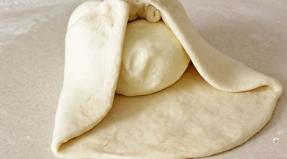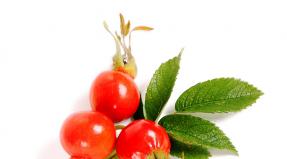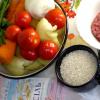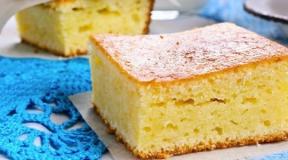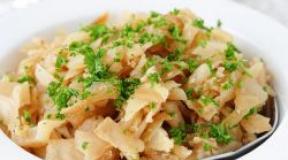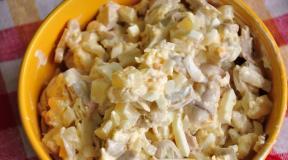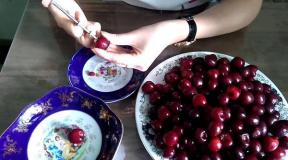Dry rosehip tea. How to make rosehip tea? Why is rosehip tea useful? What is its harm? Kidney stones recipe
Wild rose berries contain a rich complex of vitamins and other nutrients; they have long been used by humans for medicinal purposes. Vitamin tea made from it is one of the most famous and popular traditional medicine, which has a lot of useful properties and a minimum of contraindications.
The benefits and medicinal properties of rose hips
Rosehip is unpretentious, it grows everywhere and is loved by people everywhere. Wild rose has up to four hundred varieties around the world, and they all have medicinal properties. The roots and flowers have healing power, but the bright red fruits of the shrub are especially widely used.
 Red rose hips - a storehouse of vitamins
Red rose hips - a storehouse of vitamins
The main useful property of the plant: its berries are the strongest natural antioxidant and immunomodulator.
The concentration of vitamin C in the infusion of berries is comparable to the content of ascorbic acid in citrus fresh juices. And in the fruits themselves, vitamin C in "pure form" reaches 15 percent, which is 10 times more than in black currants and 50 times more than in lemons! Rosehip also contains vitamins A, E, almost all group B, trace elements necessary for the human body, pectins, organic acids, nutrients and biologically active substances.
Vitamin P promotes the absorption of ascorbic acid and strengthens the capillaries, vitamin K is involved in the synthesis of prothrombin and improves blood quality. This, in particular, explains the beneficial effect of rosehip tea on the cardiovascular system. Long-term use of the drink regulates redox reactions and metabolic processes, debugs the body's work, and normalizes blood pressure.
In the cold season, rosehip tea is literally irreplaceable - it compensates for the lack of vitamins, stimulates the defenses, which is an excellent prevention of flu and colds.
When harvesting dried fruits in late summer and autumn, collect it away from industrial enterprises and highways. They use not only fresh ripe fruits, but also dry them for future use - naturally, in the oven or in an electric dryer.
 Natural vitamin capsules - dried rose hips
Natural vitamin capsules - dried rose hips
Properly dried berries preserve all the nutrients intact, and tea from them turns out to be even more tasty and concentrated than from freshly picked rose hips. In the same way, flowers and rosehip roots are harvested for future use - teas from which are used in folk medicine.
Application features
Of course, healthy and tasty tea should not be carried away without measure. The daily norm for an adult is two, maximum three glasses, a child can drink a glass two to three times a day. The drink is taken for two weeks in a row, then a weekly break is taken, after which the course is repeated.
As an anti-cold and antipyretic remedy, tea should not be drunk cold or hot, the optimal temperature of the drink in this case is 40 degrees. Stir a spoonful of honey in a cup and drink slowly in small sips. The last reception is mandatory at night, before bedtime.
As a choleretic agent, with inflammation of the gallbladder, the drink is taken three times a day, half an hour before meals, for two weeks.
In addition, rosehip tea is an excellent energy drink. Drink a cup on an empty stomach instead of coffee - and energy is guaranteed for the whole day!
Here is just a short list of the healing talents of rosehip tea:
How to brew rosehip tea: healthy recipes
With all the variety of options for rosehip tea, it is necessary to pay main attention to the quality of the main components of the infusion - the berries and water themselves. Water should be at least well purified, filtered, and even better - spring water. Do not boil it for a long time so as not to deplete the oxygen content. Properly dried rose hips can be crushed - in a mortar or coffee grinder - so that the beneficial substances from them are well extracted into the drink. But at the same time, the infusion will have to be carefully strained so that the villi from the "insides" of the berries do not get into the tea.
If the berries are brewed whole, then it is advisable to do this in a thermos. Also, not too long - so that beneficial substances do not disintegrate under the influence of high temperature.
With green tea
This tea improves all processes in the body, from digestion to mood. The components of the drink are a storehouse of vitamins and minerals.
 Infusion with rosehip and green tea tones up and activates all body processes
Infusion with rosehip and green tea tones up and activates all body processes
Ingredients:
Preparation:
Take a warm glass three times a day, half an hour before meals.
With hawthorn
The drink has a sedative, decongestant, bile and diuretic effect, relieves inflammation and pain in diseases of the joints and kidneys, relieves the condition even with epilepsy. The ingredients in tea also promote milk production during breastfeeding.
 Tea with rosehip and hawthorn relieves pain, swelling, inflammation, supports the heart
Tea with rosehip and hawthorn relieves pain, swelling, inflammation, supports the heart
Ingredients:
Preparation:
Take half a glass three times a day before meals.
With raspberries
Proven anti-cold, diaphoretic and antipyretic agent.
 Tea with raspberries and rose hips relieves fever and cures colds
Tea with raspberries and rose hips relieves fever and cures colds
Ingredients:
Preparation:
Tea for each meal must be made fresh. It is advisable to drink at night in order to immediately wrap up well and go to bed. If you want, take the drink during the day, but you must be in a warm room, without drafts.
With viburnum
Fresh viburnum grated with sugar is characterized by a pronounced antipyretic effect. The anti-inflammatory properties of rose hips can help cure colds.
 Viburnum tea with rose hips - the best prevention in the cold season
Viburnum tea with rose hips - the best prevention in the cold season
Ingredients:
Preparation:
We filter and drink a glass three to four times a day. It is advisable to cover yourself with a warm blanket and go to bed after taking a drink. The drink helps bring down the heat.
With black currant
Strengthens the immune system, protects against colds and flu. Cleans the blood from toxins and toxins.
 Rosehip and black currant tea enhances immunity, cleanses the blood
Rosehip and black currant tea enhances immunity, cleanses the blood
Ingredients:
Preparation:
Tea can be taken three to four times a day, a glass.
With medicinal herbs
Rosehip gives herbal teas a noble aroma and acidity, and also enhances the healing properties of other plants. The components can be selected arbitrarily - according to your own needs and preferences: mint, thyme, calendula, chamomile ... Excellent results are achieved by experimenting with herbal mixtures.
 Medicinal herbs for tea for every taste and choice
Medicinal herbs for tea for every taste and choice
Ingredients:
Preparation:
Take half a glass three times a day.
Rosehip tea with raisins in a thermos - video
Suitable for use during pregnancy, breastfeeding and for children
It is useful to drink rosehip tea for expectant and lactating mothers, young children. You can brew a drink for them according to the classic recipe: pour boiling water in a liter thermos and leave for 7-8 hours 200 grams of red berries. Hot milk can be used instead of water for brewing. Tea restores strength, strengthens the immune system and the nervous system, cleanses the body.
A natural immunomodulator will protect a pregnant or lactating woman from colds and viral infections and many problems without medication that cannot always be taken. The rich complex of vitamins and minerals will come in handy for both the expectant mother and her long-awaited baby.
 Kids love the sweet and sour taste of rose hips!
Kids love the sweet and sour taste of rose hips!
Children, depending on their age, should reduce a single dosage of tea by half or three times compared to an adult. If your child often suffers from colds, then rosehip tea will help him better than any pharmacy remedy in a beautiful box. And the point is not even that such a treatment will cost an order of magnitude cheaper - ten rose hips contain the daily norm of ascorbic acid for children: this natural, safe medicine is easily absorbed and gives a quick positive result.
Rosehip tea is useful for babies not only in the cold season, but also in summer. After all, vitamin C breaks down under the influence of direct sunlight.
The drink is given to children starting from the age of eight months - they start with 100 grams per day and gradually increase the daily dosage. It is a strong diuretic, so it is not advisable for babies to take it at night. Teach your child to drink tea through a straw to preserve tooth enamel.
Slimming with rose hips
Nutritionists recommend rosehip tea for those looking to lose weight. There is even a special diet based on the intake of this drink.... Tea should be drunk daily for ten days. That is, each of ten evenings should be brewed fresh tea from 15 berries and one and a half liters of boiling water in a thermos, and the drink infused overnight should be consumed during the day. The diet menu is quite simple, and the order of its first eight days can be arbitrarily changed. The bottom line is that only one product is consumed on each day, but in any quantity.
Rosehip tea, if desired, is supplemented with green tea and not very strong coffee. You cannot add sugar to drinks! Salt and spices can be consumed during these ten days, but observing a sense of proportion. If you strictly follow the rules and do not break your diet, you will lose up to 10 kilograms!
Contraindications and possible harm
The effective diet described above has its contraindications, as in all cases of drinking rosehip tea. Before you start drinking this drink, find out if you or your child is allergic to rose hips. This is especially true for nursing mothers. Tea is also contraindicated for those who suffer from the following diseases:
When you take any medication, you usually take into account that overdose is harmful and can even be dangerous. Rosehip tea is no exception; it is very useful, but in reasonable doses. For example, during pregnancy, this wonderful vitamin cocktail may turn out to be not a blessing, but a disaster - an overdose of vitamin C is fraught with troubles for the embryo and even a miscarriage. This must be remembered!
And further. Drink rosehip tea through a straw. So it will be tastier and safer for tooth enamel.
For medicinal purposes, you can use dried and fresh fruits, seeds, flowers, leaves, roots of such types of rose hips - May, loose, Daurian, spiny, dog, wrinkled, as well as varieties - Fedchenko, Begger, Webb. The berries should be picked in an ecologically clean place, and when dried, retain their natural smell, color and taste. Diseased fruits cannot be used for brewing.
Medicinal properties and indications for the use of rose hips
How can decoctions, compotes, teas, and rosehip infusions be useful? For what diseases are they prescribed? How is it used in children and pregnant women?
Healing action
What are the beneficial properties of rose hips? It contains many vitamins, first of all - a high content of vitamin C.
- The action of vitamin C (ascorbic acid)... Strengthens the immune system, increases the body's resistance to viral infections, acts as an antioxidant substance, lowers cholesterol, inhibits the formation of plaques in blood vessels.
- Vitamin A action... Increases the body's resistance to infections of various natures, has a beneficial effect on vision.
- Vitamin K action... Affects blood clotting, helps to stop internal bleeding - uterine, nasal, renal.
- The action of vitamin P... It has a beneficial effect on blood vessels, reduces their fragility.
- The action of the B vitamins... They stimulate blood formation, improve vision.
Spectrum of pharmacological action:
- fortifying;
- vitamin;
- wound healing;
- antiseptic;
- antiscorbutic;
- bactericidal;
- regenerating;
- vasodilator;
- choleretic;
- astringent;
- diuretic;
- tonic;
- antidiabetic;
- hypotensive;
- hemostatic;
- anti-inflammatory.
Read more about the chemical composition and beneficial properties of rose hips.

List of indications
- urinary system... Rosehip is a mild diuretic. It is prescribed for inflammation of the kidneys, bladder, ureters, promotes crushing and removal of small stones from the kidneys.
- Digestive organs... Rosehip drinks are useful for digestive disorders (bloating, heartburn, belching, diarrhea). Prescribed for such diagnoses: pancreatitis, cholecystitis, hepatitis, gastritis with low acidity, gastric ulcer and duodenal ulcer (chronic forms).
- Metabolic disorders... Rosehips in any dosage form, except for syrup, are indicated for diabetes mellitus in complex treatment and with a strict diet. Rosehip is also included in slimming fees, it stimulates metabolic processes, removes excess fluid from the body.
- Nervous system . Relieves fatigue, drowsiness, is indicated for neuroses.
- External use... Decoctions are used to make lotions, compresses, baths for skin lesions of various natures - eczema, psoriasis, tumors, trophic ulcers, burns, bedsores, wounds. Lotions and tonics for facial skin care are also prepared at home.
- Preventive immunostimulating agent... Rosehip drinks are often taken to prevent colds, SARS, flu. At high temperatures, it acts as a diaphoretic and antipyretic. It is also prescribed after operations, serious illnesses, fractures to strengthen the body's defenses, rapid tissue regeneration.
Application in infants
- Can I give it to newborns? You can find information that a rosehip decoction can be prescribed even to a newborn with physiological jaundice. This remedy actually lowers bilirubin. However, there are very different opinions on this matter. Neonatologists are categorically against such experiments and believe that this is a direct path to allergies in an infant. Some pediatricians do not see this as a danger if you give the baby a decoction in small doses in a strong dilution.
- At what age should be introduced into the diet? Mothers often ask: is rosehip broth considered a safe drink for babies? Indeed, in the instructions for use, it is contraindicated for up to 2 years. However, in pediatrics, you can find recommendations: to introduce rose hips in the form of compote and tea in the second half of the year in complementary foods. Most mothers still adhere to the opinion - do not rush to introduce this drink into the diet of a baby for up to a year.

During pregnancy and breastfeeding
- During pregnancy... Rosehip in the form of tea, compote and decoction is often prescribed to pregnant women as a tonic, vitamin, tonic, if there are no contraindications to use. A decoction from the fruit is considered effective for edema, which is often disturbed in late pregnancy. You can also prepare fees, which include: rosehip, hawthorn, lingonberry leaf. They strengthen the strength of a woman during the prenatal period. Read more about rose hips during pregnancy.
- When breastfeeding... Rosehip does not belong to lactogonous agents, unlike anise, dill, oregano, walnut, lemon balm, hops, sage. But it is often included in lactation fees as a fortified supplement. The drink will benefit both mother and baby, if the dosage is not violated. It is necessary to drink no more than 100 ml of compote or tea and observe the reaction of the crumbs. If the baby does not have rashes, the tummy does not bother him, you can introduce the drink into the diet in small doses.
Contraindications: exacerbation of chronic diseases of the kidneys, liver, gallbladder, bladder, stomach; acidity gastritis; blood clotting disorders; some heart disease; serious damage to the tooth enamel; allergic reaction, individual intolerance. Separately, mention should be made of thrombophlebitis - this is a strict contraindication for any dosage forms of rose hips.
Features of brewing rose hips
It is important to brew the rose hips correctly, since heat treatment destroys the most valuable substance in this berry - vitamin C. Some sources indicate that the rose hips cannot be boiled, only pour boiling water, and then insist in enameled, porcelain, glass dishes, and even better - in a thermos. The infusion time can be different - from 2 to 24 hours. Depending on this, infusions of various concentrations are obtained.
How to prepare a decoction
To prepare a rosehip decoction, you need to take dried or fresh ripe berries. In addition, the broth can be prepared from leaves, seeds, flowers, bush roots. There are many options for making a decoction. Some healers still recommend boiling the fruit (1 to 10 minutes, depending on the recipe). Sometimes there are recipes when the fruits are first infused and then boiled for a short time. Instead of a decoction, infusions can be made when the raw materials are only poured with boiling water and infused for several hours.
Preparation of a decoction of fruits (option number 1)
- Pour a glass of boiling water over 1 tbsp. l. dried rose hips.
- Insist at least 10 hours.
- Boil for 5 minutes.
- Strain before taking.
Preparation of a decoction of fruits (option number 2)
- Pour a glass of boiling water over 1 tbsp. l. dry fruits.
- Insist 24 hours.
- Boil for 5 minutes.
- Insist 2 hours.
- Strain.

Making a decoction of rosehip seeds
- Pour in 1 tsp. seed with a glass of water.
- Boil for 10 minutes.
- Insist 2 hours.
- Strain.
A decoction of seeds is most often taken as a tonic, vitamin remedy.
Cooking a decoction of rosehip leaves
- At 1 st. l. Take 1 cup of crushed leaves of water.
- Bring to a boil.
- Insist 2 hours.
- Strain.
Most often, a decoction of the leaves is taken for atherosclerosis, it is also used externally in the form of lotions and compresses. Read about the preparation of the broth in our other article.
How to make tea
Rosehip tea is the best prophylactic remedy for colds, acute respiratory viral infections, flu. It can be taken during the cold season to enhance the body's defenses. Why is rosehip tea useful?
- The drink is especially useful during the spring beriberi.
- Acts as an antioxidant, strengthens the body after severe infections.
- Normalizes digestion, gives a light astringent effect.
- Preventive remedy for the formation of kidney stones.
- It also has antiseptic, anti-inflammatory, mild choleretic, diuretic properties.
- It can be drunk with intoxication, to lower blood pressure in hypertension.
How to make rosehip tea?
- Unlike broth and compote, tea is not boiled.
- For brewing, fruits are often taken, flower petals and leaves are also used.
- Wild rose petals are added to regular black or green tea, resulting in a fragrant and tasty drink.
- For brewing, it is better to take a porcelain teapot, but you can steam the fruits in an enamel bowl, a cup for a single dose.
- Before brewing, a kettle or other utensils are poured over with boiling water.
- Usually 1/3 of the teapot is poured with boiling water, and after infusion the tea is diluted with boiling water.
- Infuse tea under a tightly closed lid for at least 1 hour.
- It is recommended to wrap the kettle with a towel to keep the temperature better.
- Whole, cut or chopped fruit can be used.
- It is believed that crushed or peeled fruits give more nutrients.
- You can also brew rose hips in a thermos - this is the most convenient and fastest way.
- You can buy pharmacy tea in the form of filter bags and brew in such a dosage - 200 ml of boiling water is taken for 2 filter bags.
- Tea can be consumed cold; in summer this drink quenches thirst well.

Rosehip tea recipe
- Pour 1 tbsp. l. chopped fruits ½ cup boiling water.
- Insist in a sealed container for 1 hour.
- Dilute the infusion with a glass of boiling water.
- Strain through a strainer before use.
Tea can be taken ½ cup 2 times a day.
Making vitamin tea (option number 1)
- Take 1 tsp. currants and crushed rose hips.
- Pour 2 cups boiling water over.
- Insist 1 hour.
- Strain before use.
Tea can be drunk in a glass 2 times a day.
Making vitamin tea (option number 2)
- Chop the rose hips, blueberries, rowan berries.
- Take 1 tbsp. l. mixed raw materials.
- Pour 2 cups boiling water over.
- Bring to a boil.
- Insist 1 hour.
It is taken hot in the same dosage. You can divide the amount of tea into 4 doses of ½ cup each. Raspberries, lingonberries, nettles are also added to the vitamin charges, honey is put instead of sugar.
How to cook compote
Rosehip compote does not have to be boiled. To preserve its medicinal properties, it can be infused in a thermos and then added to any (already cooked) compote. Rosehip will give them a pleasant sourness.
Rosehip compote recipe
- Take 4-5 tbsp. l. dry fruits, chop.
- Boil 1-1.5 liters of water.
- Add 1-2 tbsp. l. Sahara.
- Cook for 5 minutes.
- Insist until it cools completely.
Rosehip compote with raisins
- Grind 3 tbsp. l. fruits.
- Add 2 tbsp. l. raisins.
- Pour 5 cups of boiling water over.
- Insist 4 hours.
This compote is an indispensable tool used to solder children at high temperatures, significant loss of fluid in the body, and intoxication. It is prepared without added sugar.
The cookbooks contain many recipes for making rosehip compote mixed with other berries - currants, raspberries, cherries, blueberries. Its fruits go well with apples, hawthorn and dried fruits.

Basic rules for admission
How to take rosehip medicated drinks?
- Decoctions and infusions are drunk in therapeutic doses, which are prescribed by the doctor.
- Adults take ½ cup 3-4 times a day, children ¼ cup.
- Tea and compote are less concentrated drinks, they can be taken in a larger dosage - a glass at a time.
- Usually, infusions and decoctions are recommended to be taken before meals.
- The high content of ascorbic acid can damage the tooth enamel, so rinse your mouth with water after each drink.
- Prolonged use of rose hips in preventive and especially in therapeutic doses can lead to side effects - allergies, indigestion.
- It is important to observe the storage conditions for prepared drinks.
- Decoctions and teas are recommended to be prepared daily, they can be stored for no more than a day in the refrigerator.
It is better to use dried fruits, as they have much more vitamin C than fresh berries.
Rosehip decoction is prescribed for diseases of the stomach, liver, kidneys, urinary, gall bladder, metabolic disorders, neurasthenia, diseases of bones and joints. Outwardly, it is used for skin lesions. Compote and tea from the berries of this plant are often prescribed as a vitamin, tonic, tonic, antioxidant agent. It is recommended for the prevention of vitamin deficiency, viral infections during pregnancy, in children, nursing mothers.
Rosehip tea for the majority of representatives of the current generation is a kind of reality, antiquity, a drink from the times of the USSR, irrevocably gone into history along with the realities of everyday life. Yes, the healing power of the drink is gradually being forgotten. The volume of industrial output has dropped significantly, if not to say that it has stopped altogether. And in vain. This natural product is an effective cure for many diseases. Particularly pleased with the fact that raw materials can be prepared independently at home.
The chemical composition of the fruit
Botanists identify several dozen species of rosehip plants. And it turns out that everyone differs in the content of active substances - vitamins, sugars and acids.
Scientists have long proven the fact that vitamin C is accumulated in rose hips much more than in black currants, lemons, needles and junipers. And then there is a reservation - we are talking about plant species with white and red petals.
In the fruits of pink rose hips, there is less ascorbic acid, and in a plant with yellow flowers, the useful substance is completely absent.
Rosehip fruits are also rich in tannins and tannins. In medicine, these substances are used as astringent drugs, antidotes against certain types of poisons. Doctors note their hemostatic, antidiarrheal, antihemorrhoidal ability.
Finally, rose hips are rich in beta-carotene, which plays an important role in maintaining 100% vision.
Cooking applications
From the fruits and petals of rose hips, you can prepare a lot of culinary masterpieces - healing sweets and drinks, for example:
- jam,
- jam,
- marshmallow
- marmalade,
- candy,
- jelly.
Rosehip tea is especially common among Russians. Let's get acquainted in more detail with the traditions of its preparation, useful properties, simple recipes.
Benefits for the body
Doctors note that when any food is boiled, most vitamins and minerals are destroyed. Rosehip tea is no exception. Drying and heat treatment of fruits significantly reduce the valuable indicators of the chemical composition. Nevertheless, people have long and successfully tested and proven the following beneficial properties of rosehip tea:
- strengthens and improves the condition of blood vessels,
- replenishes iron deficiency in case of anemia,
- reduces pressure
- has a positive effect on digestion processes.
However, I would especially like to pay attention to such useful properties of rosehip tea as:
- strengthening the immune system,
- removal of puffiness.
Very often, doctors prescribe rosehip tea for pregnant women, as well as for people who have undergone surgery.
In the first case, beneficial fruits help to cope with puffiness, and in the second, with the depletion of the body due to surgery and anemia.
Attention! Rosehip tea is very useful for children! In the absence of allergies, this product can be added to the diet of a child from 6 months of age!
With a cold
Rosehip tea cannot be called a remedy for viral diseases. However, one should not refuse his help in the fight against the approaching OVRI. As already mentioned, a record amount of vitamin C and other excipients will increase the resistance of immunity to viruses, accelerate metabolism, which means it will contribute to a speedy recovery.
For pregnant
If the pregnancy is proceeding normally, a woman can safely vitaminize her body with a natural remedy - rosehip tea. It not only saturates the body with vitamin C, but also removes puffiness, and also relieves the symptoms of toxicosis.
Again, tea drinking should be done in moderation and under the supervision of a doctor. Indeed, sometimes pregnant women suffer from constipation, surges in blood pressure. And these are the reasons why it is better to refuse the rosehip.
Contraindications
Allergy
Rosehip tea can cause allergic reactions! This happens in the following cases:
- overdose,
- individual intolerance to the individual components of the composition.
As for the first point, you need to know the daily requirement of a person of a particular age in vitamin C and not exceed it.
The second point is about cross-reaction. If the patient is allergic to peaches, apples or apricots, you should expect similar symptoms when eating rose hips.
Other caveats
- ulcer
- gastritis,
- thrombophlebitis,
- endocarditis,
- low pressure,
- constipation.
If you have any of the listed health problems, it is better to consult your doctor before drinking rosehip tea.
Question: "how to brew rosehip tea?" cannot be called stupid. The main task in preparing a drink is to preserve the useful components of raw materials as much as possible.
High temperature, long heat treatment are directly to blame for the fact that any product loses some of its vitamins, which means it becomes less valuable. To prevent this from happening, it is better to prepare rosehip tea in the following way:
- 3 tbsp dry collection (about 18-20 fruits), wash, put in a thermos pre-treated with boiling water
- pour the fruits with hot water (about 60 ° C)
- the thermos is closed, removed to infuse tea for 1 - 6 hours.
At the end of the specified time, the drink is poured into a mug and honey or sugar is added.
On a note! Unlike most medicinal decoctions, rosehip tea is not only healthy, but also delicious. Children drink it with pleasure. This is a great substitute for store-bought juices and sodas!
Varieties of drinks
In fact, there are many ways to brew rosehip tea. And the secrets of cooking boil down not only to preserving the medicinal properties, but also to enrich the taste.
Lovers of natural (organic) food use the recipes of classic pure rosehip tea or combine it with other spices and herbs. Let's consider the simple options available.
Classic infusion
This should include the whole dried fruit recipe described above, and add a couple of lines about chopped freshly picked rose hips.
To prepare a drink you need:
- 4 tbsp. chop tablespoons of freshly harvested raw materials with a blender
- pour over a thermos or glass jar with boiling water
- fold the chopped rosehip into a container and pour hot water - 60 ° С
- remove the drink for 1-6 hours for infusion
- strain using a fine mesh strainer.
On a note! If there is a rose hip bush nearby, then it's a good idea to add fresh rose petals to the drink!
Mint recipe
Collection for brewing:
- 1 tbsp. l. black tea,
- 2 leaves of mint and strawberry leaves,
- 5 rose hips,
- 5 dry strawberries (strawberries).
Clean leaves and fruits, together with black tea, are placed in a heated teapot, poured with hot water - 90 ° C. After 10 minutes, jam, sugar or honey are added to the tea and enjoy a pleasant taste.
Rosehip with milk
Is it worth recalling that the combination of healing fruits with milk is an excellent remedy in the fight against colds? The brewing method is simple:
- bring milk to a boil, set aside for 2 minutes
- wash 3 tbsp. dry fruits
- put the rose hips in a jar, pour a liter of milk
- after an hour, pour the drink into a glass, heat slightly and add honey.
Fruit and herbal tea with thyme
It turns out that thyme is a great companion for rose hips. The ingredients must be brewed separately, and then combined together. This fruit and herbal tea has a pronounced antiseptic, analgesic effect, and is also very useful for various etiologies of cough, for example, bronchitis.
On a note! At the next visit to the therapist, inquire about the medicinal properties of the composition of thyme and rose hips. Surely, get a recommendation for use.
Useful Supplements
Those who are not afraid to experiment, and also love new taste sensations, should pay attention to the following herbs and fees. In rosehip tea, they have proven themselves well:
- ginger,
- raspberries,
- currant,
- linden,
- hawthorn,
- lemon,
- orange.
Attention! The listed fruits, roots, berries and leaves are full of useful vitamins and minerals. They are widely used in the fight against all kinds of colds. Don't miss your chance to get stronger and healthier with natural and harmless foods.
The method of making tea with all additives is universal. Steam rose hips according to the classic recipe. Put honey, a slice of lemon or ½ tsp in a glass with the finished drink. chopped ginger. Can you use ginger and lemon at the same time? Can.
As for the addition of raspberries, currants or hawthorn berries, they are placed in a teapot along with rose hips. The quantitative ratio is 1: 1 or 1: 2 in favor of rose hips.
Harvesting at home
Lucky for those who have the opportunity to harvest rose hips on their own in the fall. This means that all winter you can drink a miraculous drink and not get sick. But what is the best way to process the fruit to preserve its beneficial properties?
Know the best preservative agent is cold. Washed, dried from moisture, rosehip is placed in a jar and sent to the freezer. If necessary, take out part of the fruit and brew.
From various herbs and berries. One of the most popular and beloved is rosehip tea. And this is by no means a new word in health nutrition.
The benefits of rosehip tea have been known since time immemorial.
Before the advent of the fashion for black tea and coffee in our country, thirst was quenched with other drinks everywhere. In summer and autumn, in dry weather, people were engaged in collecting useful plants. The traditional infusions of herbs and berries that were drunk every day included tea with rose hips, the beneficial properties of which have been known for a long time. For brewing, not only fruits were dried, but also flowers, leaves and even roots. The roots and leaves were used for medicinal purposes, and fragrant flowers and berries were brewed with boiling water and insisted in a warm place - this drink was especially aromatic. The leaves of raspberry, currant, mint and other aromatic herbs were added to the rosehip. They made drinks from mixtures of wild rose berries with blueberries, sea buckthorn, chokeberry, blackberries and others.
Who can drink a decoction of wild rose fruits?
Traditional and folk medicine in our time, without fail recommends everyone to drink rosehip tea. Its benefits and harms depend only on the dosage. In the spring, when we suffer from vitamin deficiency, twice a day a decoction of wild rose, or, as it is also called, wild rose, will only be appropriate. Rosehip tea is harmful only in case of excessive consumption of the drink. In reasonable amounts, it improves overall well-being, normalizes blood pressure and improves metabolism.
What does a wild rose look like and where does it grow?
Rosehip is a low, up to two meters, thorny bush. In our country, it can be found almost everywhere, with the exception of the Arctic territories. It is also widely distributed in America and Australia. The wild rose served as the basis for selective breeding of shrubs and breeding of decorative varieties that are used to decorate parks, gardens, and to create bouquets. The fruits of the wild and cultivated rose are very similar.

These are oval berries of a red-brown color, up to two centimeters in the longest part. The inside of the fruit is covered with numerous bristles, which, when ingested, cause discomfort. The seeds are white, up to two millimeters in size. For medicinal purposes, only wild varieties are used. Rosehip cannot be confused with any other plant. The scent of its flowers is very recognizable. It is not for nothing that essential oils obtained from the petals of its flowers are used in perfumery when creating perfumes and for aromatizing creams and lotions.
Harvesting fruits
There are many varieties of rose hips, it is also called not only wild rose, but also cinnamon rose, there are a lot, but not all of them are considered medicinal. For health-improving and medicinal purposes, fruits are harvested not round, flattened towards the center, but oval and elongated in length. In medicinal species, the sepals are stretched forward, like a peak, and in those with no vitamin value, they are twisted back towards the berry, and almost lie on it.
The shrub blooms from mid-May to July, and the ripe fruits are harvested in late summer and early autumn. After frost, they lose their healing qualities. And the beneficial properties of rosehip tea are largely due to the high amount of vitamin C in the berries, which is quickly destroyed at low temperatures.
Compotes, jams, marshmallows are cooked from fresh wild rose berries. Fruit processing is time consuming, since the berries must be cleaned of internal bristles and hard seeds. From one kilogram of freshly picked berries, less than half a kilogram of raw materials suitable for canning is obtained.

Internal bristles are an unpleasant feature of berries
Rosehip berries for tea can be taken fresh, dried, as well as processed into syrup or jam. Since the rose hip has peculiar bristles inside, processing it presents a certain difficulty. These bristles will not cause any inconvenience only if the berries are dried whole and have not been crushed for brewing tea. Sometimes, for medicinal purposes, it is recommended to brew dry berries, after grinding them. This is done if they want to get not only delicious, but also the tea made from rosehip, which is maximally saturated with valuable trace elements. The benefit of crushed berries is that they contain vitamin E, carotene, tocopherol, oleic, linoleic, linolenic and other acids more easily pass into the drink.
What kind of water to use?
One of the primary requirements for a tea drink is the quality of the water used for it. The recognized authority in the field of brewing medicinal infusions - Chinese medicine - divides water into seven types. The best is mountain or key, as well as spring. This water is of the highest quality. The river, according to its useful properties, follows it. Next on the list is well water. Nikolai Spafari, who was the ambassador to Beijing in the 17th century, recalled in his notes that the Chinese did not take water for brewing tea from the nearest reservoirs, but bought it at the bazaar. It was brought from the mountainous regions, and it was very expensive.

The best water temperature for brewing rose hips
The temperature of the brewing water is also important. The Chinese, as the most authoritative experts in the preparation of tea drinks, distinguish a great many stages of boiling water. One of the initial stages - bubbles, similar to fish eyes and a slight noise, then - the splash of water and splashes from a collision with the wall of the dish, then - bubbles rising from the bottom and "daring" bubbling. It is believed that the water most suitable for brewing tea is when the bubbles rise like the eyes of a crab. At the first stage of boiling, salt should be thrown into the water, at the second - the rose hips, and at the third - a little cold water in order to precipitate the rose hips and revive the freshness of the water. You should be aware that water cannot be boiled again.
10 secrets of good wild rose tea
Chinese medicine has developed ten rules for the correct preparation of medicinal decoctions, in particular, this is how tea with rose hips should be brewed. The beneficial properties of the drink will be preserved most fully if you act in accordance with the following recommendations:

What determines the quality of the fruit?
Rose hips contain fruit sugar, organic acids. In terms of vitamin C content, rose hips are ahead of almost all plant foods. Its quantity directly depends on the place of growth, the degree of maturity and the quality of drying and storage. Do not pick berries from bushes growing within the city. To do this, it is better to go to ecologically clean zones that are found in almost every region of Russia. Dried fruits retain their beneficial properties for two years.
Unique composition and beneficial effect of berries and tea
Fruits contain sugars, organic acids, in addition to the aforementioned vitamin C, vitamins of group B (B 1, B 2), vitamins P and PP, K, carotene, tannins, flavonoids, salts of iron, manganese, phosphorus, magnesium, calcium and other Rosehip tea has a multivitamin, anti-inflammatory and anti-sclerotic effect. It is highly effective as a choleretic and diuretic. Rosehip stops internal bleeding. Vitamin C helps to increase redox processes in the body, enhances the synthesis of hormones and the activity of enzymes. In addition, it promotes tissue renewal, increases the body's resistance to adverse environmental influences.

Green tea with rose hips
It is recommended to drink green tea with rose hips in case of hypertension, for the prevention and treatment of atherosclerosis. It is very good as a general tonic. It is better to drink it in the morning on an empty stomach. It is a good prophylactic remedy for many diseases. It normalizes the state of the nervous system, enhances potency. Green tea with wild rose berries relieves painful symptoms in gynecological and urological problems, promotes healing of internal wounds and ulcers.

Rosehip tea: benefits and harms
The diuretic properties of wild rose are used in the treatment of urolithiasis. With inflammation of the gastric mucosa caused by low acidity of gastric juice, patients are also prescribed rosehip tea. Contraindications are diseases accompanied by high acidity. Since rosehip has a pronounced diuretic effect, it must be taken with caution by people with problems in the cardiovascular system.
Multivitamin drink
Prophylactic and multivitamin cinnamon rose tea is brewed as follows. Two full tablespoons of dry crushed fruits are poured with a glass of boiling water and kept in a water bath for about ten minutes. Then they insist in a warm place for half an hour. Strain through a gauze filter and drink a third of a glass a day after meals.
Rosehip tea helps with anemia, hemophilia, hemorrhagic diathesis, diarrhea, tuberculosis and colds, it is drunk with neurasthenia as a sedative. Rosehip helps to alleviate the course of many diseases. It is a widely recognized multivitamin and general tonic with a broad spectrum of action.

An effective decoction for the treatment of diseases of the stomach and intestines
Due to its rich and well-balanced composition, rose hips are widely used in the treatment of a large number of diseases. The fruits of this shrub are part of many medicinal preparations. With a stomach ulcer or 12 duodenal ulcer, as well as in the case of prolonged gastritis, the following collection is very effective:
- rose hips, 3 parts;
- dried dry 1 part;
- white rose flower petals, 1 part;
- pharmacy chamomile flowers, 1 part;
- calendula flowers, 1 part;
- field horsetail (shoots), 1 part;
- wormwood (grass), 2 parts;
- common hawthorn (grass), 2 parts;
- 7 parts;
- plantain (leaves), 4 parts;
- st. John's wort (herb), 4 parts;
- dill (seeds), 3 parts.
Pour a tablespoon of the mixture with boiling water (0.5 liters), darken for 30 minutes, filter and drink during the day in several doses, 15-20 minutes before meals. The taste of the infusion is bitter due to wormwood and a large amount of yarrow. Rosehip tea, the recipe for which is given above, can be made from fresh berries and herbs. In this case, the proportions are maintained.

Rosehip tea is best sweetened with natural flower honey. Only honey should not be put in boiling water. From this he will lose his useful properties. Try making a wild rose berry drink with brown cane sugar. This is delicious.
Rosehip is known for the usefulness of its fruits, but medicinal infusions and teas are made even from the petals and roots of this plant. Dried rose hips are easy to buy from grandmothers on the market and add them to vitamin drinks. However, it is worth knowing that you cannot constantly drink such tea, there is an opinion that prolonged use of rose hips negatively affects tooth enamel.
I really enjoy making rosehip tea in a thermos. In my opinion, this is the most successful and convenient way to get a rich drink. But, of course, you can make tea in a saucepan or in a teapot, but the dishes in this case should be opaque.
So, you need dried rose hips and clean water.
The water needs to be boiled.

While the water is boiling, prepare the fruits. If they are well dried, then it will not be difficult to press them down with a wide knife blade and thus chop them. Less dried fruits will simply crack, which is also acceptable.
Also, as an option, you can grind the fruits in a mortar, in a coffee grinder. Be careful: the needles inside the rose hips can tingle your hands unpleasantly.
The version that you should not grind the fruits before brewing, there is a place to be, but such tea is definitely less tasty and rich.

Put the chopped rose hips in a thermos, which must first be rinsed with boiling water.
Cover with boiling water.

Twist and let it brew. The longer the tea is infused, the deeper and richer its taste will be, but at the same time it will cool down. 1.5-2 hours is enough to get a good hot tea, moderately saturated.

Use a strainer to pour the rosehip tea into a hot cup.

Add sugar or honey to taste. I like this tea on its own, no additives.


